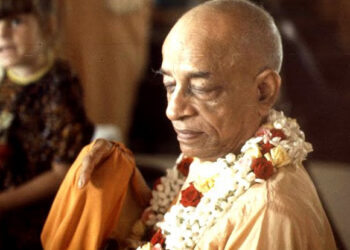TEXT 45
prayatnād yatamānas tu
yogī saṁśuddha-kilbiṣaḥ
aneka-janma-saṁsiddhas
tato yāti parāṁ gatim
SYNONYMS
prayatnāt—by rigid practice; yatamānaḥ—endeavoring; tu—and; yogī—such a transcendentalist; saṁśuddha—washed off; kilbiṣaḥ—all of whose sins; aneka—after many, many; janma—births; saṁsiddhaḥ—having achieved perfection; tataḥ—thereafter; yāti—attains; parām—the highest; gatim—destination.
TRANSLATION
And when the yogī engages himself with sincere endeavor in making further progress, being washed of all contaminations, then ultimately, achieving perfection after many, many births of practice, he attains the supreme goal.
PURPORT
A person born in a particularly righteous, aristocratic or sacred family becomes conscious of his favorable condition for executing yoga practice. With determination, therefore, he begins his unfinished task, and thus he completely cleanses himself of all material contaminations. When he is finally free from all contaminations, he attains the supreme perfection—Kṛṣṇa consciousness. Kṛṣṇa consciousness is the perfect stage of being freed of all contaminations. This is confirmed in the Bhagavad-gītā (7.28):
yeṣāṁ tv anta-gataṁ pāpaṁ
janānāṁ puṇya-karmaṇām
te dvandva-moha-nirmuktā
bhajante māṁ dṛḍha-vratāḥ
“After many, many births of executing pious activities, when one is completely freed from all contaminations, and from all illusory dualities, one becomes engaged in the transcendental loving service of the Lord.”
TEXT 46
tapasvibhyo ‘dhiko yogī
jñānibhyo ‘pi mato ‘dhikaḥ
karmibhyaś cādhiko yogī
tasmād yogī bhavārjuna
SYNONYMS
tapasvibhyaḥ—than the ascetics; adhikaḥ—greater; yogī—the yogī; jñānibhyaḥ—than the wise; api—also; mataḥ—considered; adhikaḥ—greater; karmibhyaḥ—than the fruitive workers; ca—also; adhikaḥ—greater; yogī—the yogī; tasmāt—therefore; yogī—a transcendentalist; bhava—just become; arjuna—O Arjuna.
TRANSLATION
A yogī is greater than the ascetic, greater than the empiricist and greater than the fruitive worker. Therefore, O Arjuna, in all circumstances, be a yogī.
PURPORT
When we speak of yoga we refer to linking our consciousness with the Supreme Absolute Truth. Such a process is named differently by various practitioners in terms of the particular method adopted. When the linking process is predominantly in fruitive activities it is called karma-yoga, when it is predominantly empirical it is called jñāna-yoga, and when it is predominantly in a devotional relationship with the Supreme Lord it is called bhakti-yoga. Bhakti-yoga, or Kṛṣṇa consciousness, is the ultimate perfection of all yogas, as will be explained in the next verse. The Lord has confirmed herein the superiority of yoga, but He has not mentioned that it is better than bhakti-yoga. Bhakti-yoga is full spiritual knowledge, and therefore nothing can excel it. Asceticism without self-knowledge is imperfect. Empiric knowledge without surrender to the Supreme Lord is also imperfect. And fruitive work without Kṛṣṇa consciousness is a waste of time. Therefore, the most highly praised form of yoga performance mentioned here is bhakti-yoga, and this is still more clearly explained in the next verse.


















